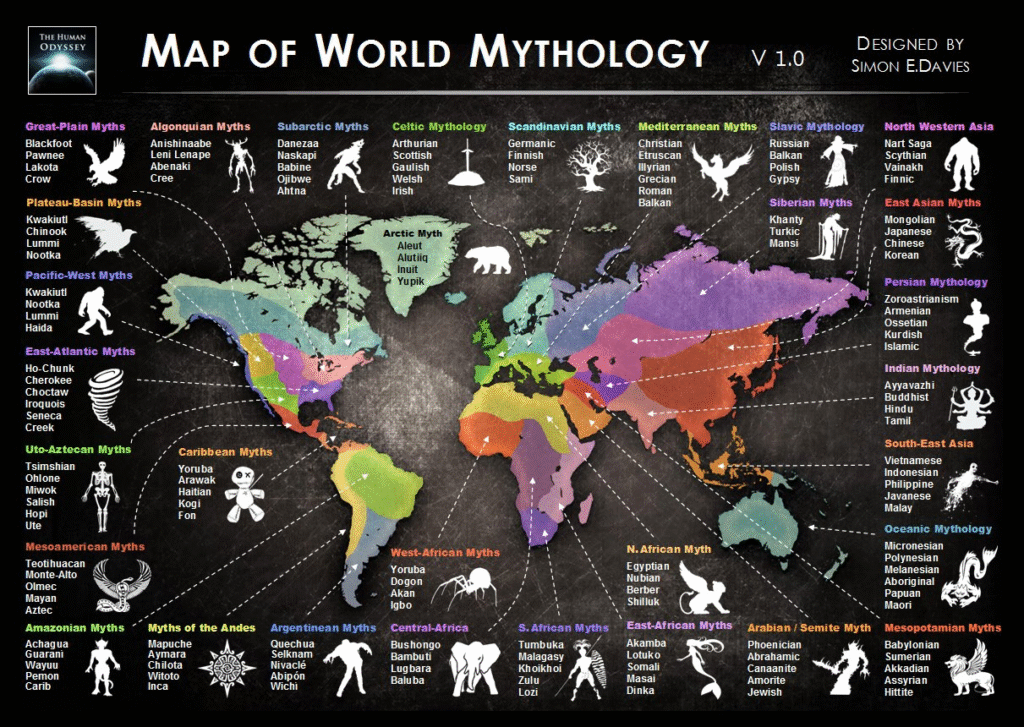MYTH ORIGINS ACROSS THE WORLD

It should be realized that some ancient myths about the “gods” were actually rooted in stories about real people.
Many pagan religions began, in part, as ancestor and hero worship.
See Thomas Bulfinch, Bulfinch’s Mythology, “Stories of God’s and Heroes,” chap. 25: “Origin of Mythology,” 1855, 1979).
Thomas Bulfinch (July 15, 1796 – May 27, 1867) was an American author born in Newton, Massachusetts, known best for Bulfinch’s Mythology, a posthumous combination of his three volumes of mythologies.
Bulfinch’s Mythology
Bulfinch published a reorganized version of the biblical book of Psalms to illustrate the history of the Hebrews.
However, he is known best as the author of Bulfinch’s Mythology, an 1881 compilation of his three previous works:
- The Age of Fable, or Stories of Gods and Heroes (1855)
- The Age of Chivalry, or Legends of King Arthur (1858)
- Legends of Charlemagne, or Romance of the Middle Ages (1863)
Bulfinch’s Mythology is a classic work of popularized mythology, the standard for more than a century and still in print.
The compilation, assembled posthumously by Edward Everett Hale, includes various stories belonging to the mythological traditions known as the Matter of Rome, the Matter of Britain and the Matter of France, respectively.
Bulfinch wrote in his preface:
“Our work is not for the learned, nor for the theologian, nor for the philosopher, but for the reader of English literature, of either sex, who wishes to comprehend the allusions so frequently made by public speakers, lecturers, essayists, and poets, and those which occur in polite conversation.”
The original volume was dedicated to Henry Wadsworth Longfellow, and Bulfinch described it on the title page as an:
“attempt to popularize mythology and extend the enjoyment of elegant literature”
In his preface he outlined his purpose, which was:
“an attempt to solve this problem, by telling the stories of mythology in such a manner as to make them a source of amusement.
We have endeavored to tell them correctly, according to the ancient authorities, so that when the reader finds them referred to he may not be at a loss to recognize the reference.
Thus we hope to teach mythology not as a study, but as a relaxation from study; to give our work the charm of a storybook, yet by means of it to impart a knowledge of an important branch of education.
The index at the end will adapt it to the purposes of a reference, and make it a Classical Dictionary for the parlor.”
Bulfinch’s Mythology. – Anna’s Archive
Bulfinch’s mythology of Greece and Rome with Eastern and Norse legends – Anna’s Archive
Bulfinch’s mythology: the age of fable: The age of chivalry: Legends of Charlemagne – Anna’s Archive
Dr. Joseph P. Farrell’s Cosmic War
Presents the history of the Exploded Planet hypothesis. Rejecting naturalist and materialist assumptions of catastrophism forwarded by other researchers, this work asserts that the causes are based in ancient myths of a Cosmic War in the heavens.
The similarity and variance in myths globally is astounding as Bruce Rux points out.
It implies common background but distortion of meaning over time!
Now I found out where the name Votan resembling Wodan or Odin comes from in south America.
The Family of Odin – Library of Rickandria
The Anglo-Saxon Chronicle, specifically the Parker Chronicle (also known as the A-version), contains genealogies that trace the lineage of Anglo-Saxon kings back to Woden (a figure akin to the Norse god Odin) and, in turn, to the biblical Noah.
Anglo-Saxon Chronicle | Anglo-Saxon Archaeology
The Parker Chronicle 832-900 (Methuen’s Old English Library) – Anna’s Archive
Anglo-Saxon Royal Genealogies:
Many of the Anglo-Saxon royal houses, particularly in the later periods, claimed descent from Woden to legitimize their rule.
Aegean Royal Lines from Zerah – Library of Rickandria
Were the Greeks Israelites? – Library of Rickandria
Anglo-Saxon royal genealogies – Wikipedia
Connection to Biblical Patriarchs:
These genealogies, particularly after the conversion of Anglo-Saxons to Christianity, were extended further back to include biblical patriarchs like Noah and even Adam, as seen in the Parker Chronicle.
The Parker Chronicle: 832-900 (exeter Medieval Texts And Studies Lup) – Anna’s Archive
Purpose of the Genealogies:
These elaborate genealogies served to reinforce the divine origins of kingship and establish the kings’ authority and right to rule.
The Trojan Origins of European Royalty! – Library of Rickandria
The Parker Chronicle provides a detailed list, tracing the line from Noah to Japheth (known as Sceaf to the Anglo-Saxons) and then through subsequent generations, including Woden and his descendants.
West Saxon Genealogical Regnal List – Wikipedia
Cambridge, Corpus Christi College, MS 173: The Parker Chronicle – Parker Library On the Web – Spotlight Exhibits
This connection was used to establish the kings’ legitimacy and reinforce their rule.
Royal Babylon: The Alarming History of European Royalty – Library of Rickandria
Miles Williams Mathis: Thrones infiltrated – Library of Rickandria
But there are also Egyptian links to North & South American Indians.
